Fact Checking - Tumblr Posts
(Free Palestine anon)
Ok so...Idk if you're jewish and/or have much knowledge about this kind of prejudice, but do you have advice for how to avoid (or at least to pay attention) in case a certain post has some antisemetic misinformation?
(If you didn't understand, I could try to make it clear)
If you're asking how to avoid misinformation in posts, the answer is the same as with any validity verification of information:
Check who is posting it. Do they post a lot of contradictory information? Do they claim to be a certain ethnicity, religion, race, ect? Do they speak in certain ways? Do they post or reblog a lot of the same content or information? Are they politically bias? (E.g; they might claim to be British but is the way they speak distinctly Irish or American?)
Research the information given in the post for yourself. Make sure to look at a variety of sources, not just one. Is there a lot of people referencing this information? Has anyone called this information false on other platforms? Can you find any evidence to support the information given? Are there news articles, broadcasts, ect?
If you like to have breaks from subjects of an upsetting nature but still want to remain informed, consider creating a second account where you can follow a multitude of people who's primary focus is what you want to be informed about. This way you can use that blog to fact check, investigate, follow people, source and so forth while not having the entirety of your dashboard on your "main" account flooded constantly with content you may not be in the mindset to see.
Lest we succumb to blindly reblogging tweets like the pro-Hamas people, I went and found some sources.
Here is the article linked in the tweet:

It says that the Ministry of Health has “incomplete data” for about 10,000 of their reported casualties. They haven’t specified why the data is incomplete. The article also sources this earlier article on the same website:
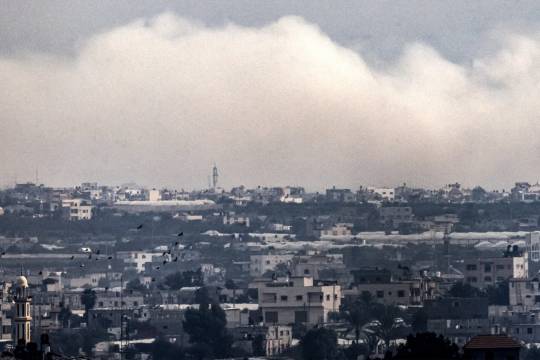
The Ministry of Health is claiming to have gotten their data from “reliable media sources,” but won’t clarify anything else. That claim is sourced to this Wall Street Journal article, which I cannot read in its entirety because it wants me to pay for it:
https://www.wsj.com/articles/hamass-numbers-games-civilian-death-counts-casualty-data-b99140eb
Trying to find a link to a primary source for that roughly 10,000 number led me in circles for a while, but so many sources are claiming it that it feels a little more credible. In fact, NPR's article on the topic claims roughly 13,000 people have been "identified" this way!
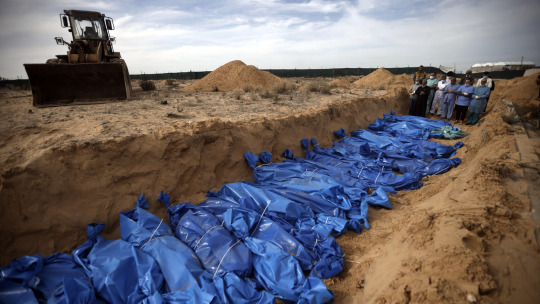
The original article is from Foundation for Defense of Democracies, which is a neoconservative publication that has been accused of having a pro-war and anti-Muslim bias. For our purposes, they seem to be critical of PLO leadership, but take all of that with a grain of salt because my source is the Criticism section on Wikipedia:
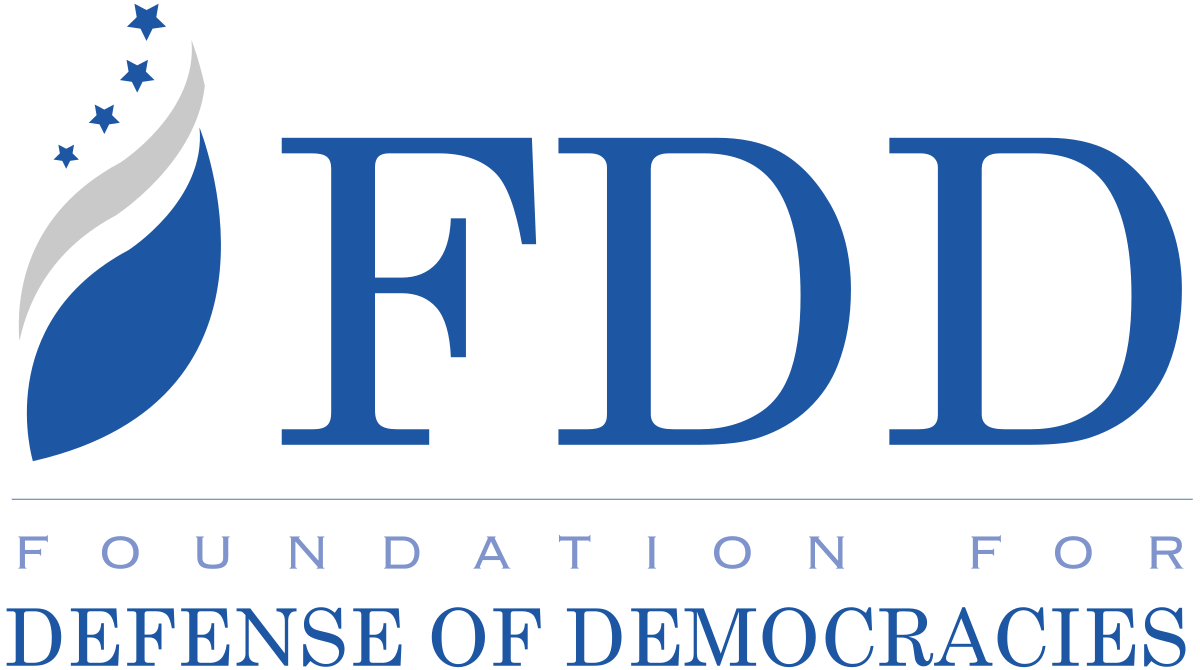
In conclusion, Hamas has NOT claimed that they over counted or that their numbers are inaccurate (clearly), but it seems to be true that they did.

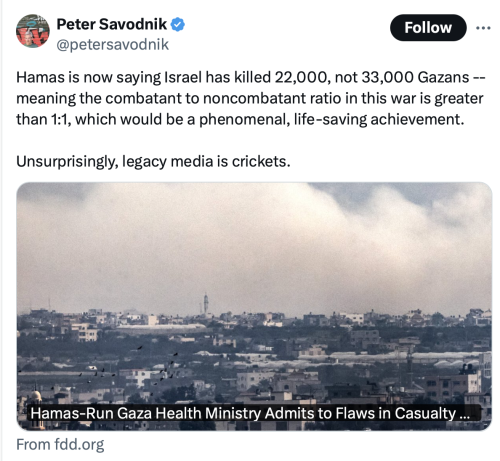
how do you fact check stuff?
what do can I do to fact check stuff myself?
hi, good question!
A Quick Guide To Fact Checking
Finding information:
How I go about fact checking varies slightly depending on what I'm fact checking. If the post has provided a source, I usually start by assessing the credibility of the source; if there's no source, I might start by doing a preliminary search using a search engine (I use DuckDuckGo).
If the topic is a popular one, it might be worth checking whether it's already been fact checked. Check out Snopes, Reuters Fact Check, FactCheck.org or Politifact.
If it's a complex topic, it is sometimes worth checking out Wikipedia, not to use as a source, but to get some general background on the topic. Fact checking is harder when you don't have context. I then do a more specific search, and start reading a few articles from reputable sources.
There are certain subjects that I sometime used a different approach for. For example, if it's a medical topic, I might start by searching PubMed.
A good resource to check the reliability of media sources is Media Bias/Fact Check. You can type in your source, and they will rate their political bias and score their factual reporting.
You can find more tools that help fight disinformation here.
I would also recommend checking out @rovermcfly 's Media Literacy Masterpost.
Media Literacy Masterpost
This post is constantly evolving. You can help by sharing resources you know, pointing out broken links or even expressing criticism of the resources provided here if you have any. Come back any time to see if there's anything new. (Google Docs version for easier sharing outside tumblr)
Updated: February 21st 2023
The Basics
Get answers to the first questions you might have: What is media literacy? Why should I care? How does it affect me and others? Is there even anything I can still learn if I feel pretty internet-savvy? And more.


Websites
Get a more in-depth look at certain aspects of media literacy and learn about and apply media literacy skills.
Truth Decay Project Tools Database* (A lot of websites that are relevant are listed here. Only websites that aren't on that list will be listed in this post)
National Association for Media Literacy Education
Poynter
MediaWise (by Poynter)
Media Literacy Now
The Media Bias Chart
SourceWatch
Reuters Fact Check
The Conspiracy Chart
MediaSmarts
Casey Fiesler
InVid
News Literacy Project
Harvard Misinformation Review
Check Your Fact
Articles
See what experts have to say.


Interactive Learning Tools
This can help you learn about media literacy in a more hands-on way.
Truth Decay Project Education/Training Tools* (A lot of interactive tools that are relevant are listed here. Only websites and tools that aren't on that list will be listed in this post)
Go Viral! (Covid Misinformation)
News Lit Quiz
Critical Thinking Project
Social Media
Following these accounts can help sharpen your media literacy skills and you don't even have to do much because it will just pop up in your feeds! Follow, like, comment, retweet, etc. to help spread the word.
Tumblr
@is-the-post-reliable
YouTube
MediaWise
MediaSmarts
PolitiFact
I have personally left twitter due to its new ownership, so it will be difficult for me to keep vetting the listed accounts the way I used to, however I will keep them listed as long as I still trust them.
MediaWise
National Association for Media Literacy Education
PolitiFact
Fact-Checking Network
AFP Fact Check
Reuters Fact Check
Media Literacy Now
Abbie Richards
TikTok
MediaWise
Abbie Richards
Aslan Pahari
Astro Alexandra
Professor Casey
Hank Green
Adam Conover
PolitiFact
Zeke Darwin
babs_zone
MediaWise
Media Literacy Now
PolitiFact
Bonus
My media literacy tag
Remember to share these resources to help shape a world wide web that is safer and smarter and protect yourself and others from manipulation and radicalization.
* Criticism of this source has been expressed. I've provided my reasoning to still include it as well. I encourage you to make your own judgement.
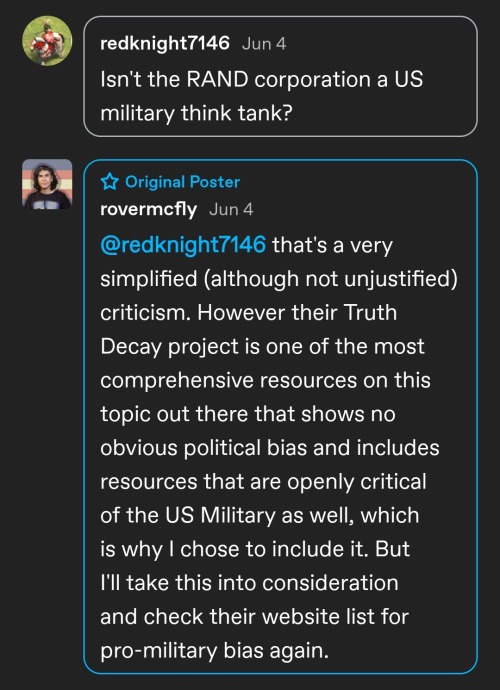
[Image ID in alt]
(I could since then not find an obvious bias in the lists that I have linked)
Information on the history of the RAND Corporation and its involvement with the US Military here.
how do you fact check stuff?
what do can I do to fact check stuff myself?
hi, good question!
A Quick Guide To Fact Checking
Finding information:
How I go about fact checking varies slightly depending on what I'm fact checking. If the post has provided a source, I usually start by assessing the credibility of the source; if there's no source, I might start by doing a preliminary search using a search engine (I use DuckDuckGo).
If the topic is a popular one, it might be worth checking whether it's already been fact checked. Check out Snopes, Reuters Fact Check, FactCheck.org or Politifact.
If it's a complex topic, it is sometimes worth checking out Wikipedia, not to use as a source, but to get some general background on the topic. Fact checking is harder when you don't have context. I then do a more specific search, and start reading a few articles from reputable sources.
There are certain subjects that I sometime used a different approach for. For example, if it's a medical topic, I might start by searching PubMed.
A good resource to check the reliability of media sources is Media Bias/Fact Check. You can type in your source, and they will rate their political bias and score their factual reporting.
You can find more tools that help fight disinformation here.
I would also recommend checking out @rovermcfly 's Media Literacy Masterpost.
The BBC didn't make this list. It's based off of a list from a poll BBC did of people's 100 most beloved novels which people voted on. But the claim that BBC believes most people have only read six of these is untrue. This version of the list was made by someone online and started circulating.
Also, regardless of the quality of the list, there is no top 100 books you need to read. If you read 100 books, no matter the books, that's great. If you read 50 books that's great. Or 40, or 30, or 20. That's still an accomplishment. Be proud of yourself.
How many have you read?
The BBC estimates that most people will only read 6 books out of the 100 listed below. Reblog this and bold the titles you’ve read.
1 Pride and Prejudice - Jane Austen 2 Lord of the Rings - J. R. R. Tolkein 3 Jane Eyre – Charlotte Bronte 4 Harry Potter series 5 To Kill a Mockingbird - Harper Lee 6 The Bible 7 Wuthering Heights – Emily Bronte 8 Nineteen Eighty Four – George Orwell 9 His Dark Materials – Philip Pullman 10 Great Expectations – Charles Dickens 11 Little Women – Louisa M Alcott 12 Tess of the D’Urbervilles – Thomas Hardy 13 Catch 22 – Joseph Heller 14 Complete Works of Shakespeare 15 Rebecca – Daphne Du Maurier 16 The Hobbit – JRR Tolkien 17 Birdsong – Sebastian Faulks 18 Catcher in the Rye 19 The Time Traveller’s Wife - Audrey Niffeneger 20 Middlemarch – George Eliot 21 Gone With The Wind – Margaret Mitchell 22 The Great Gatsby – F Scott Fitzgerald 23 Bleak House – Charles Dickens 24 War and Peace – Leo Tolstoy 25 The Hitch Hiker’s Guide to the Galaxy – Douglas Adams 26 Brideshead Revisited – Evelyn Waugh 27 Crime and Punishment – Fyodor Dostoyevsky 28 Grapes of Wrath – John Steinbeck 29 Alice in Wonderland – Lewis Carroll 30 The Wind in the Willows – Kenneth Grahame 31 Anna Karenina – Leo Tolstoy 32 David Copperfield – Charles Dickens 33 Chronicles of Narnia – CS Lewis 34 Emma – Jane Austen 35 Persuasion – Jane Austen 36 The Lion, The Witch and The Wardrobe – CS Lewis 37 The Kite Runner - Khaled Hosseini 38 Captain Corelli’s Mandolin - Louis De Bernieres 39 Memoirs of a Geisha – Arthur Golden 40 Winnie the Pooh – AA Milne 41 Animal Farm – George Orwell 42 The Da Vinci Code – Dan Brown 43 One Hundred Years of Solitude – Gabriel Garcia Marquez 44 A Prayer for Owen Meaney – John Irving 45 The Woman in White – Wilkie Collins 46 Anne of Green Gables – LM Montgomery 47 Far From The Madding Crowd – Thomas Hardy 48 The Handmaid’s Tale – Margaret Atwood 49 Lord of the Flies – William Golding 50 Atonement – Ian McEwan
51 Life of Pi – Yann Martel 52 Dune – Frank Herbert 53 Cold Comfort Farm – Stella Gibbons 54 Sense and Sensibility – Jane Austen 55 A Suitable Boy – Vikram Seth 56 The Shadow of the Wind – Carlos Ruiz Zafon 57 A Tale Of Two Cities – Charles Dickens 58 Brave New World – Aldous Huxley 59 The Curious Incident of the Dog in the Night-time – Mark Haddon 60 Love In The Time Of Cholera – Gabriel Garcia Marquez 61 Of Mice and Men – John Steinbeck 62 Lolita – Vladimir Nabokov 63 The Secret History – Donna Tartt 64 The Lovely Bones - Alice Sebold 65 Count of Monte Cristo – Alexandre Dumas 66 On The Road – Jack Kerouac 67 Jude the Obscure – Thomas Hardy 68 Bridget Jones’s Diary – Helen Fielding 69 Midnight’s Children – Salman Rushdie 70 Moby Dick – Herman Melville 71 Oliver Twist – Charles Dickens 72 Dracula – Bram Stoker 73 The Secret Garden – Frances Hodgson Burnett 74 Notes From A Small Island – Bill Bryson 75 Ulysses – James Joyce 76 The Bell Jar – Sylvia Plath 77 Swallows and Amazons - Arthur Ransome 78 Germinal – Emile Zola 79 Vanity Fair – William Makepeace Thackeray 80 Possession – AS Byatt 81 A Christmas Carol – Charles Dickens 82 Cloud Atlas – David Mitchel 83 The Color Purple – Alice Walker 84 The Remains of the Day – Kazuo Ishiguro 85 Madame Bovary – Gustave Flaubert 86 A Fine Balance – Rohinton Mistry 87 Charlotte’s Web – EB White 88 The Five People You Meet In Heaven – Mitch Albom 89 Adventures of Sherlock Holmes – Sir Arthur Conan Doyle 90 The Faraway Tree Collection – Enid Blyton 91 Heart of Darkness – Joseph Conrad 92 The Little Prince – Antoine De Saint-Exupery 93 The Wasp Factory – Iain Banks 94 Watership Down – Richard Adams 95 A Confederacy of Dunces – John Kennedy Toole 96 A Town Like Alice – Nevil Shute 97 The Three Musketeers – Alexandre Dumas 98 Hamlet – William Shakespeare 99 Charlie and the Chocolate Factory – Roald Dahl 100 Les Miserables – Victor Hugo
I've still not gotten over the results of this poll, and in fact have decided it makes an excellent example of how only doing part of the work for an important task can be not only as useless, but also sometimes more useless than putting in the effort to do all the work instead.
Consider, if you will, an analogy to building a bridge over a deep river.
Nominally, you can first divide people into two groups: those who want to build a bridge to get across, and those who decide not to build a bridge.
For the people who look at the river and decide that building a bridge is too much work - they don't have time, lack the knowledge and/or resources, just honestly don't even care all that much about getting to the other side anyway, etc - they at least will ideally be aware that if they later change their minds and would like to reach the other side of the river, they're going to have to suck it up and swim.
For those who decide to try their hand at bridge-building (assuming you've randomly selected a bunch of people from the general population in this admittedly rather silly analogy), it seems reasonable to expect that some percentage of them will get partway and give up with only, like, half a bridge, or even just a pile of materials they collected up and then abandoned when they realized they had no idea what to do with it. Others, likely, won't be professional bridge builders but will manage to see the work through and get some degree of hopefully functional bridge that may or may not dump them in the river when it breaks halfway across. And some percentage would, if the sample size is large enough, hopefully know or be able to learn what they're doing and complete the work of building functional bridges.
The group which represents the most common answer from the poll in this analogy, unfortunately, is none of the above groups.
Imagine, now, a group of people who looked at the river, realized they knew a few things about both water and bridges, and decided that: first, they didn't really need a bridge until the water was too deep to feel safe anymore; and second they only really needed to look up how to build bridges when it came to the parts of bridge building they were already aware they didn't know.
And this group of people wind up with bridges that have no anchors to stable ground on either side where they felt confident just wading and thus only begin when the water is already over their heads, and which are also liable to break and dump them in the water anyway because they're missing some critical component that the builder in question wasn't already aware they were ignorant of before they began constructing their mid-river bridge.
In conclusion:
Don't build your bridge in the middle of the river, and don't leave in stupid defects because you didn't bother double-checking every part.
If you don't want to build a bridge, then just own that and don't build a bridge, instead of building only half a bridge and then expecting it to function.
Fact check all the posts you share about real people and real world concerns, or you will become the person whose bridge has no connection to any ground you already thought was stable enough to walk on, and which is missing all the parts you didn't already know you didn't know before you started.
There are a lot of consistently repeated "facts" around tumblr that fall somewhere in this gradient—some of which are only corrected by actually crunching numbers, reading scientific papers, etc. Falling for misrepresented data isn't anyone’s fault, but it does mean that some things that "everyone knows" are straight up incorrect, because the source was written by someone who didn't understand what they were reporting on, or the subject was twisted to suit a narrative (for personal reasons, monetary gain, etc).
Meanwhile, SOME claims just don't have a real source at all.
Do you check sources before you repeat a factoid or spread a post?
–
We ask your questions so you don’t have to! Submit your questions to have them posted anonymously as polls.
Fact Checkers
Might it now be time to hire some fact checkers for many of the posts nowadays? @staff
Tbh I think a lot of the rank-and-file goyische anti-Zionists don’t really realize that a large majority of the Jewish community sees them as a new generation trying (and thankfully not succeeding—yet) to enact another full-scale genocide against us. They’re so insulated by their tokens—who have either been gaslighted into accepting abuse or are actively trying to avoid abuse by being Good Jews—that they honestly do not understand the Evil Jews they call Zionists (who may or may not actually be Zionists) are the majority of the Jewish community.
And we despise you. We’re disgusted by you. Some of us are downright terrified of you. We see you as no better ideologically than the genocidal maniacs who have spent the last 3000 years murdering us in increasingly horrific ways. And I cannot fathom how you can see yourself as a good person or ally to Jews when the majority of the Jewish community fears and hates you as much as we do the literal Nazis.
I know you won’t, because the truth is that you do hate Jews just as much as the Nazis and everyone who came before them did, even if you deny or justify it—but you should be ashamed.

